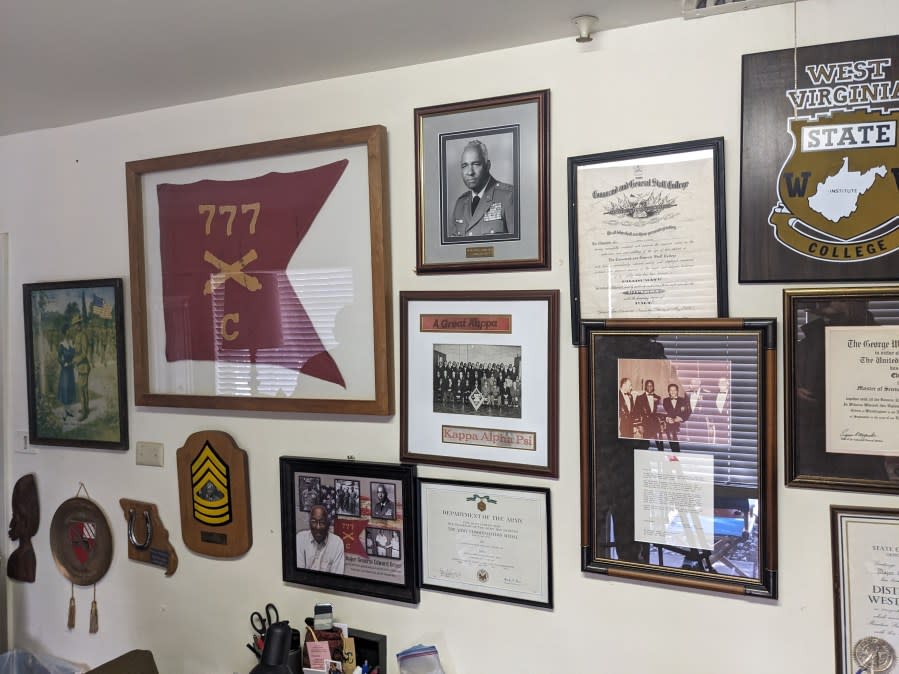Army general looks back on Korea, Vietnam, integration as 100th birthday nears

EL PASO, Texas (KTSM) — Retired Army Maj. Gen. Edward Greer, who has spent most of his retirement years in El Paso, survived three wars and growing up in a segregated United States.
He also reached the pinnacle of his chosen profession, rising to the rank of a major general or a two-star general.
As he nears his 100th birthday next month, Greer doesn’t like to think of himself as a pioneer or trailblazer as a Black man.
Distinguished Army major general to turn 100 in March
Instead, he likes to think about all the Black men who came before him, paving the way for his success.
“There were so many other guys who went down that road before I even got around,” Greer said in a sit-down interview earlier this month.
Greer, a native of Gary, West Virginia, will turn 100 on March 8.
“We have had some guys who have done some fantastic things you have probably never even heard of,” he said.


Greer started his Army adventure when he enlisted in 1943 and served for three years in World War II. He served in the 777th Field Artillery Battalion, an all-Black unit that had white officers.
After World War II ended, he would go back to college, earn a degree and then return to the Army, this time as an officer – as a young second lieutenant.
He would go on to see action in Korea and Vietnam and rise up through the ranks.
In Korea, he would earn a Silver Star, the U.S. Armed Forces’ third highest military honor for valor in combat.
In Vietnam, when he was a colonel, he would oversee four artillery units.
Greer said he really doesn’t have any memories of World War II, that it was like another lifetime ago.
He, however, has vivid recollections of both Korea and Vietnam.
“I’d say that one was a gentleman’s war (Korea) and the other (Vietnam) was hell,” he said.
“I personally had a different aspect of Vietnam,” Greer said. “I spent my tour in a helicopter. By this time in Vietnam, I was at the grade of colonel and was commanding a field artillery group of four artillery battalions, dispersed from Da Nang all the way up to the Laotian border.
“The only safe way to get to all those places was by helicopter,” he continued. “If you tried to drive a Jeep through those places, you’d end up missing in action or killed in action. It was dangerous.”
Greer said the North Vietnamese were a “ferocious enemy – highly trained – who gave you a good battle any day.”
He said he would have liked to have been a “regular tourist” and seen places like Hue, the ancient imperial capital of Vietnam that was virtually destroyed during the war.
“It was such a quaint place, but it would have been suicide, especially a lone Jeep going through an area like that,” Greer said.
Perhaps the pinnacle of Greer’s career came in 1972, when he was one of five Black soldiers who were all selected for promotion to brigadier general (one-star) on the same day.
“You recognize how few there are (Black generals) and you are one of a few,” he said. “The Army, I give them credit, to make a selection of five at one swoop (for promotion to general) … It had never been done before or never been done since.”
Only two of those soldiers selected for promotion to general that day are still alive, Greer said.
Greer spent much of his time as a general serving in the Pentagon in Washington, D.C. before retiring.
Throughout his Army career, he trained and visited Fort Bliss many times. He said he fell in love with the weather, the culture and the slower pace of life along the border. He also enjoyed going over to Juarez where he never had any problems with segregation or racism.
In 1976, he and his wife moved to El Paso and he has been living here ever since.
One of his proudest achievements was helping to raise money for and get the Buffalo Soldier statue built that is located near the entrance to Fort Bliss that is near El Paso International Airport.
That statue signifies the Black soldiers who came before him and dealt with a segregated Army long before President Harry Truman integrated it by executive order in 1948, Greer said.
Greer said the integration of the Army — six years before the Supreme Court struck down school segregation in its historic Brown vs. the Board of Education ruling — helped propel great change in the United States.
“I’ve seen a fair amount of change since I first started (in the Army),” he said. “One being the Army going from Black units and white units to primarily being one Army. I would say it has been a success.”
That successful integration of the Army spread to other areas of life, he added.
Greer has obviously seen an unimaginable amount of change in his century of life.
“It gets mind-boggling at times,” he said. “I have to admit I haven’t kept up. A lot of these things, my grandchildren are experts at and it’s news to me.
“I know every day is an achievement for me,” he said.
After he turns 100, what is his next goal?
“To make it to 101,” he said.
For the latest news, weather, sports, and streaming video, head to KTSM 9 News.

